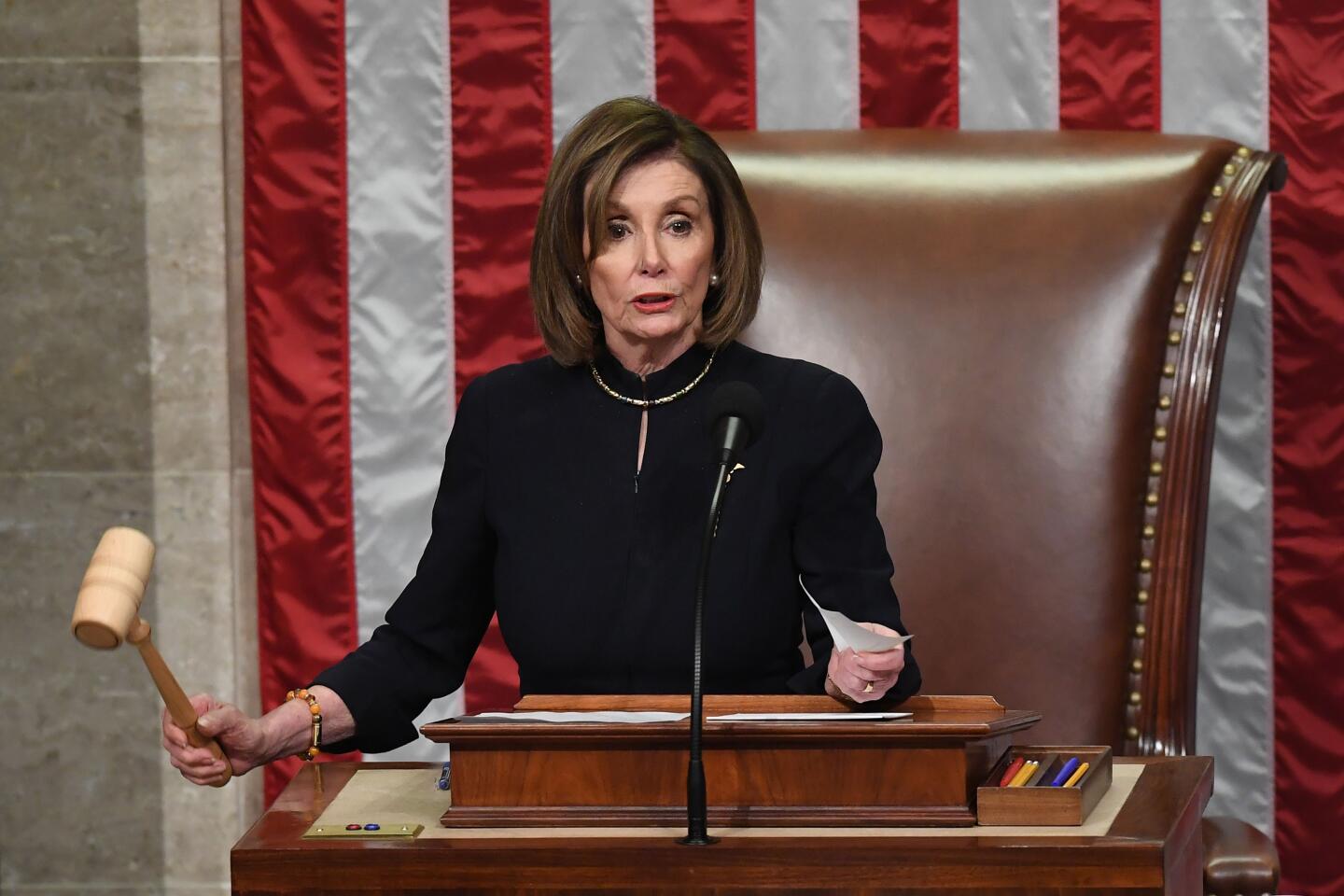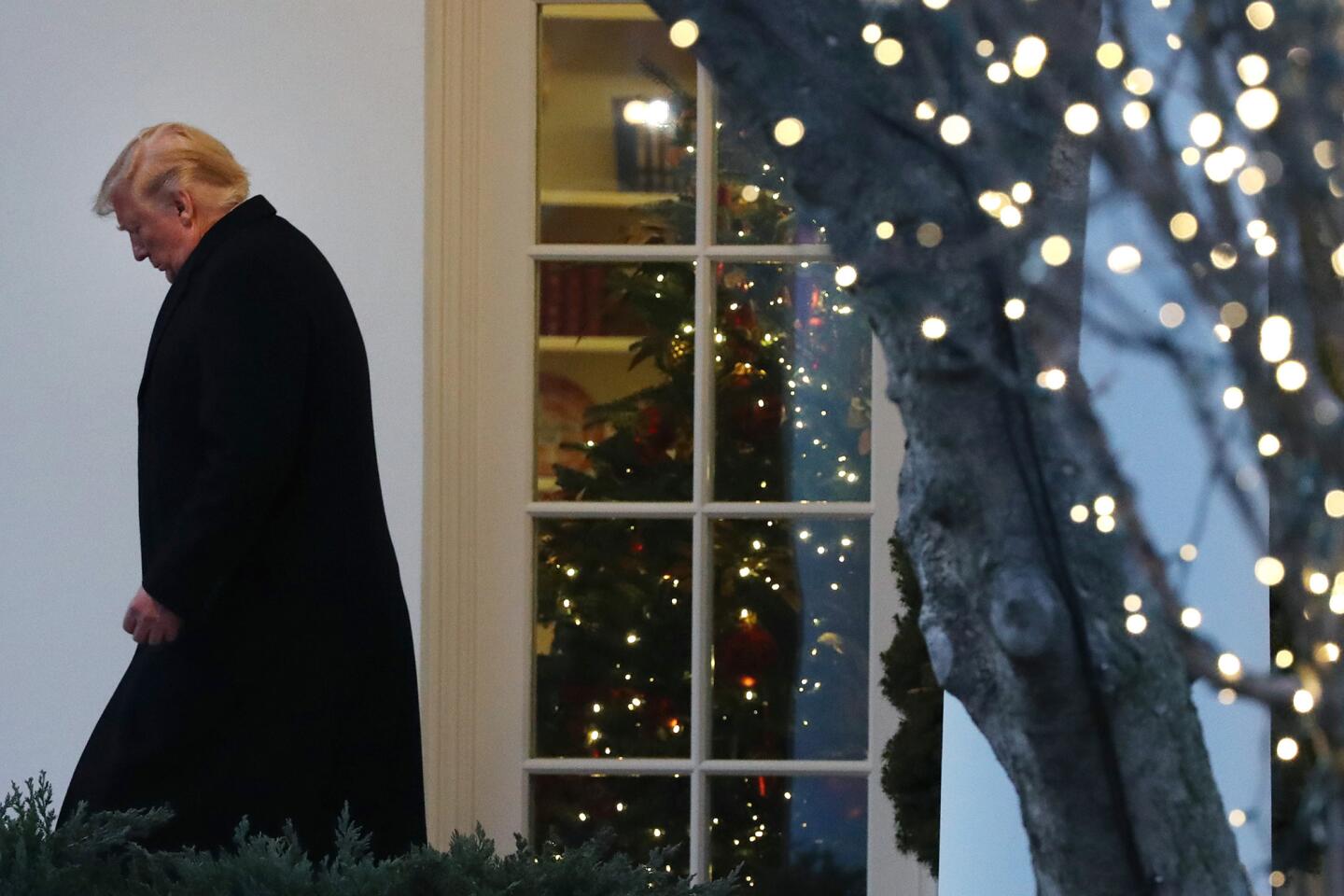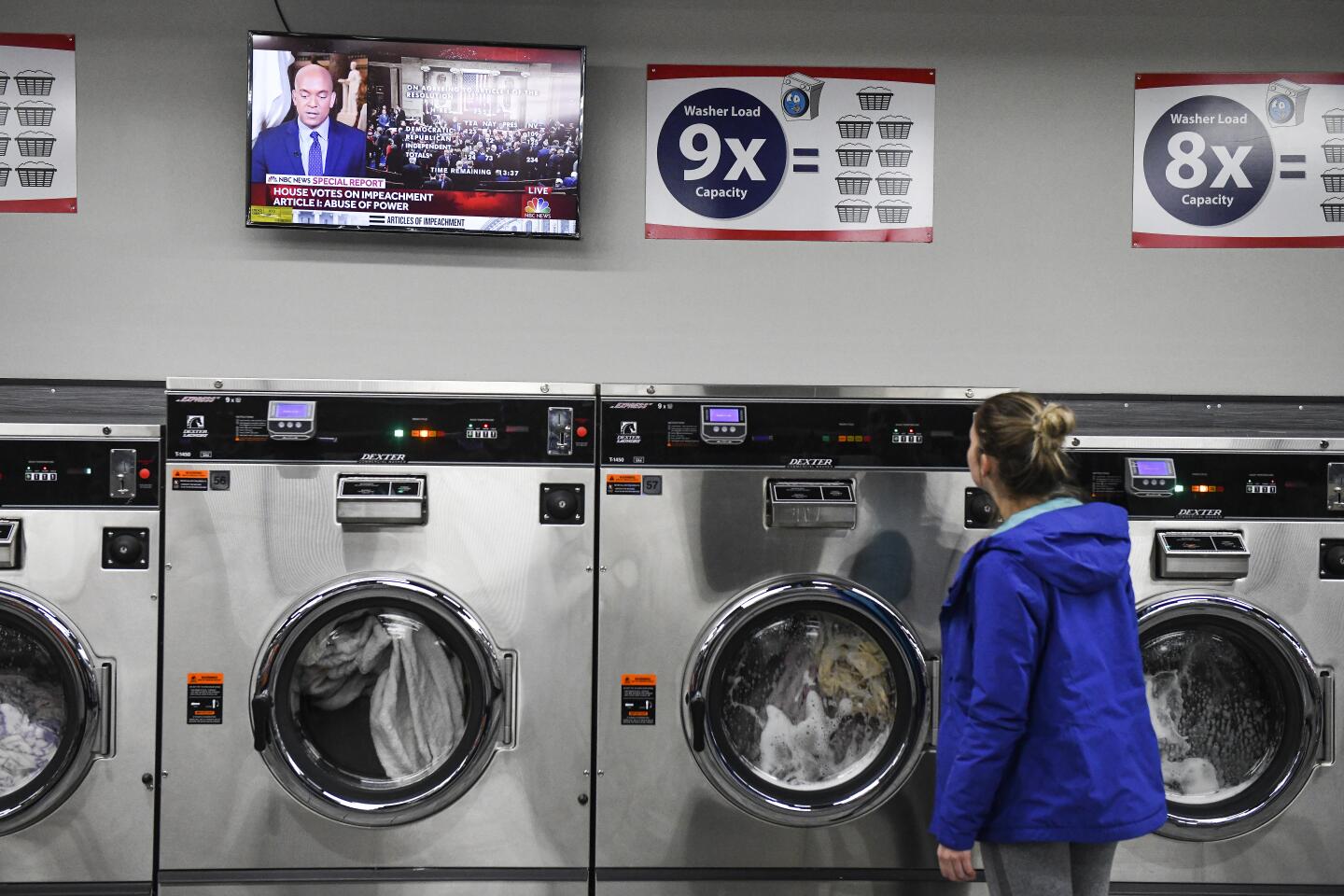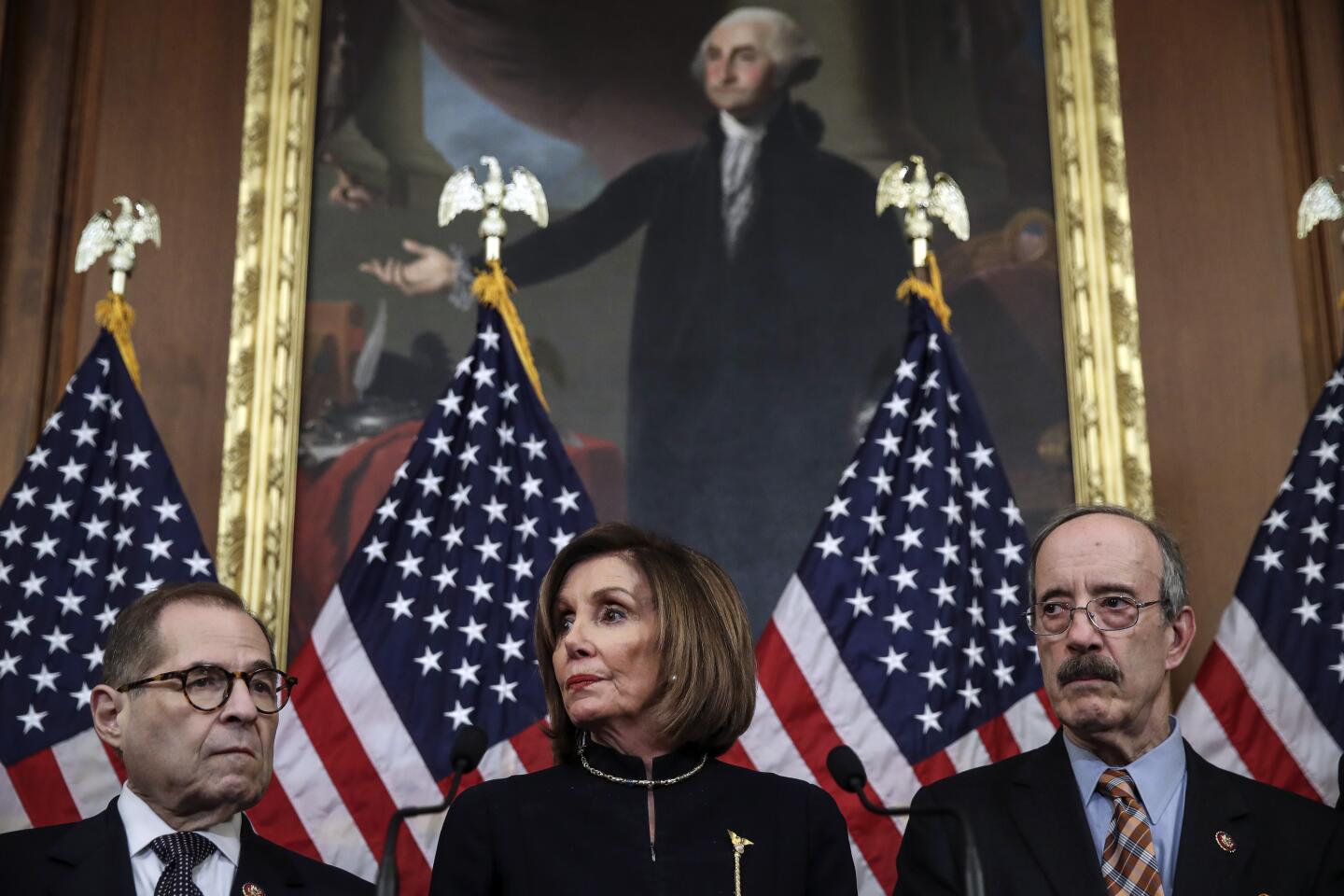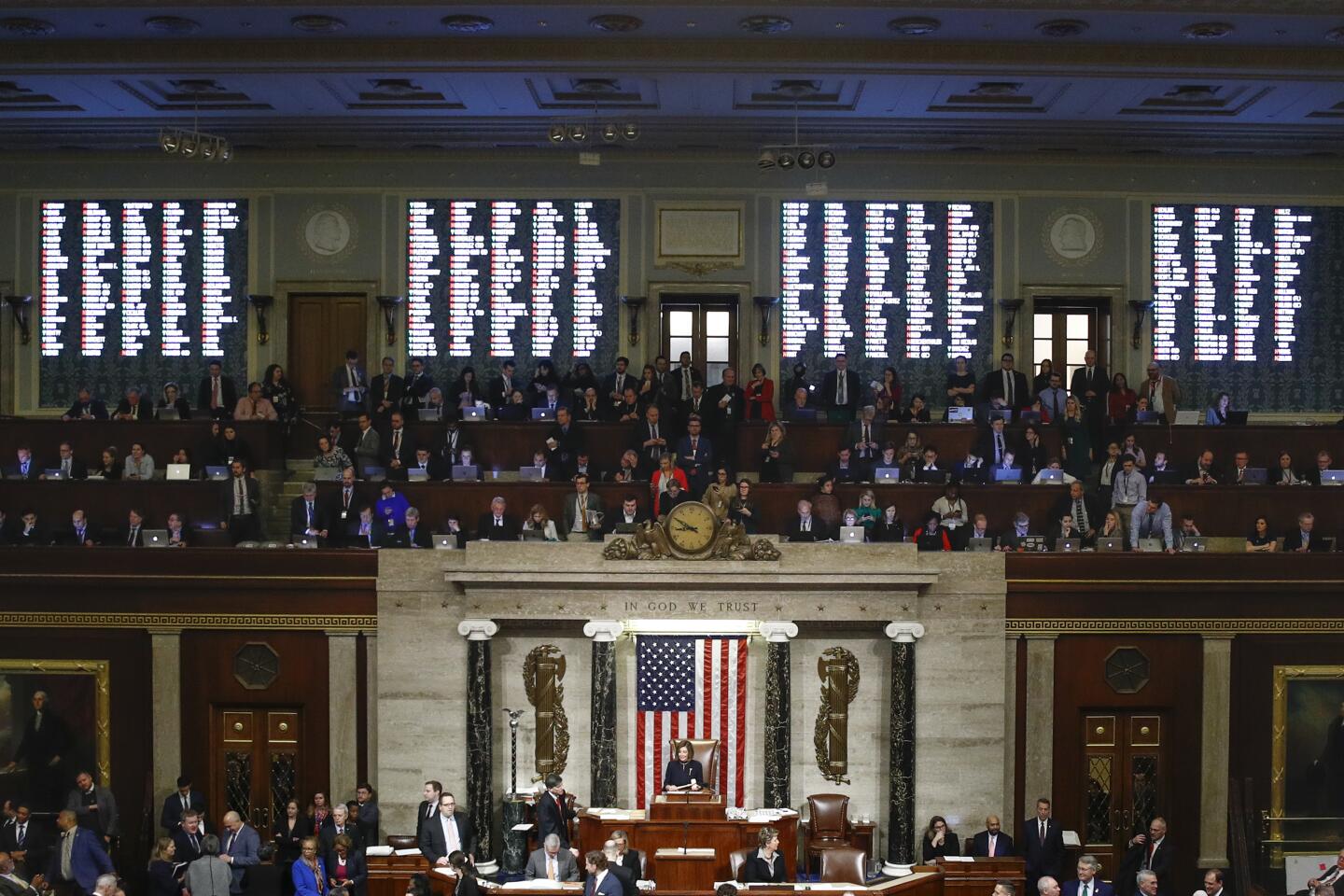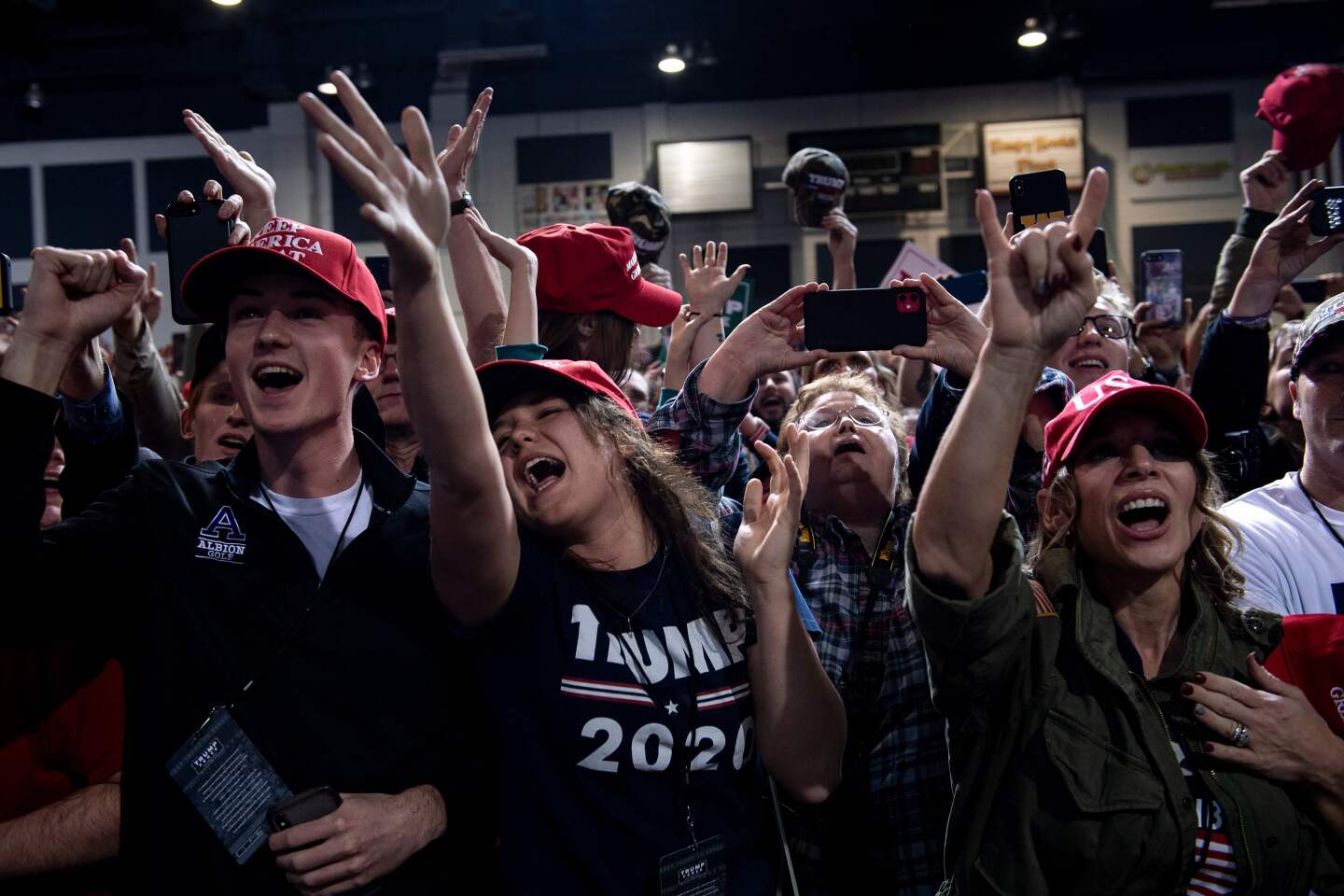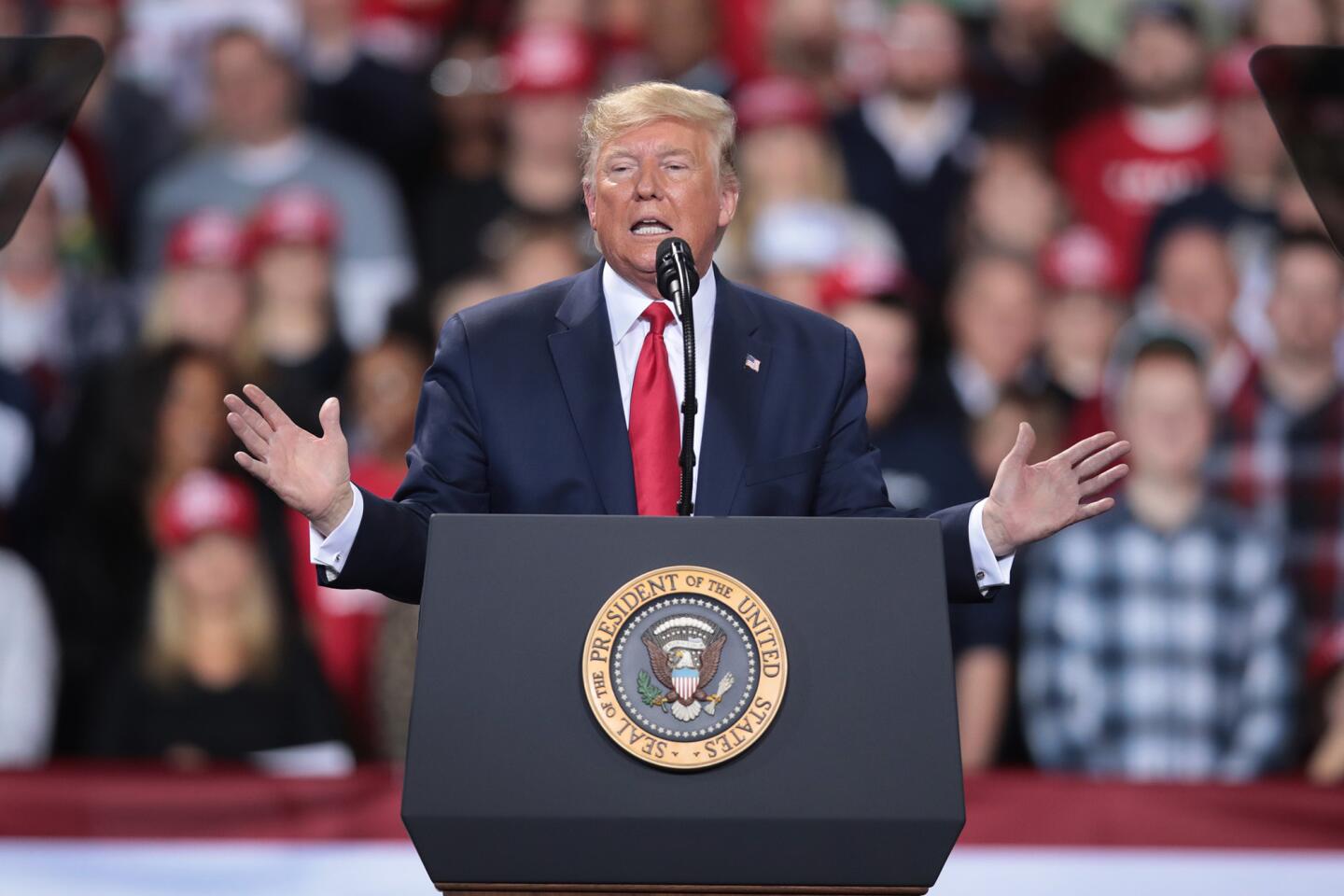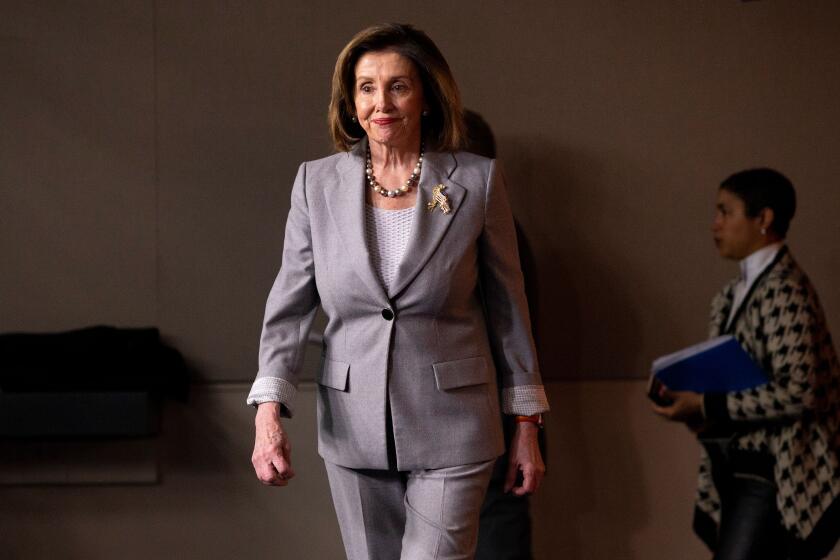House impeaches President Trump
WASHINGTON — A sharply divided House of Representatives voted Wednesday to impeach President Trump for abuse of power and obstruction of Congress, a condemnation that will permanently mar his legacy and one that only two other presidents have faced in the nation’s history.
In a partisan vote, the Democratic-controlled House approved two articles of impeachment that charged Trump with committing high crimes and misdemeanors, the constitutional standard needed to warrant his removal from office. Every Republican voted no.
The articles of impeachment next go to the Republican-controlled Senate for a trial, but that constitutional process unexpectedly fell victim to an unusual brawl between the two chambers of Congress.
After the impeachment votes, Speaker Nancy Pelosi (D-San Francisco) hinted that she might delay forwarding the articles to the Senate — delaying Trump’s expected exoneration at trial — to put pressure on Senate Republicans to accept at least some Democratic demands about how the trial should be conducted.
Republicans have said they hope to call no witnesses, while Democrats want some of Trump’s aides to testify. Either way, the president is expected to win acquittal in the Senate and remain in office — and become the first impeached president to run for reelection, shattering yet another political norm.
Democrats accused Trump of abusing his oath of office when he asked Ukrainian President Volodymyr Zelensky to investigate former Vice President Joe Biden and his son while Trump was withholding a promised White House meeting and crucial military aid to the struggling U.S. ally.
A second article of impeachment accused Trump of obstructing Congress’ investigation into the alleged scheme by refusing to release subpoenaed documents or allow current and former aides to testify.
“Taken together, the two articles charge that President Trump placed his private, political interests above our national security, above our elections, and above our system of checks and balances,” House Judiciary Committee Chairman Jerrold Nadler (D-N.Y.) said on the floor.
The back-to-back votes fell along almost strict party lines, much as polls show the country is divided. The House voted 230-197 on the first article, and approved the second article 229-198.
One Republican turned independent, Rep. Justin Amash of Michigan, voted to impeach. Only two Democrats voted against: Reps. Collin C. Peterson of Minnesota and Jefferson Van Drew of New Jersey, who is expected to switch parties to become a Republican.
Rep. Jared Golden of Maine split his vote, supporting the article of impeachment charging abuse of power, but not obstruction of Congress. Rep. Tulsi Gabbard of Hawaii, a Democratic presidential hopeful, voted “present” on both articles.
Pelosi has tried to convey a somber tone around the impeachment effort. When a smattering of Democrats cheered after the first vote, Pelosi swiftly shut them down with a stern look and a wave of her hand to counter optics suggesting Democrats were reveling in the political victory.
Despite the historic vote, Trump’s fate has been sealed for days, if not weeks, in the House. But that did not drain the emotional punch from the day’s long drama.
One by one, for more than 11 hours, dozens of Democrats and Republicans stood and offered impassioned, anguished and, in some cases, deeply personal arguments for and against the ignominy of impeachment.
Few if any Republicans echoed Trump’s claim that his conduct had been “perfect,” instead insisting that Democrats were trying to overturn the results of the 2016 election and had created a sham investigation and a constitutional crisis to do so.
Democrats framed impeachment as a constitutional burden that they did not take lightly.
“Every one of us as our first act as a member of Congress stood on this historic House floor before our beautiful American flag and raised our hands in the sacred oath” to defend the Constitution, said Pelosi, whose legacy as the first female House speaker will now also include impeachment.
Earlier this year, only a small group of progressive Democrats supported impeachment.
Those numbers swelled after the White House released a memo of Trump’s July 25 phone call with Zelensky and as the Democrats’ investigation, much of it led by House Intelligence Committee Chairman Adam B. Schiff (D-Burbank), progressed to include multiple witnesses who recounted a widespread effort to pressure Ukraine.
Republicans blasted their House counterparts for launching what they called a political, personal vendetta against Trump and argued he was never provided due process — partly because he had refused to participate in the House proceedings.
They called a moment of silence for what Rep. Bill Johnson (R-Ohio) described as the “voices of the 63 million American voters the Democrats today are wanting to silence,” those who voted for Trump in 2016. Some compared the impeachment effort to the Japanese attacks on Pearl Harbor and the crucifixion of Jesus.
“During that sham trial, Pontius Pilate afforded more rights to Jesus than the Democrats have afforded this president and this process,” said Rep. Barry Loudermilk (R-Ga.).
Trump initially watched the vote backstage at a campaign rally in Battle Creek, Mich. He later told the crowded arena that Democrats have been “trying to impeach me from Day 1.”
“After three years of sinister witch hunts, hoaxes, scams, tonight House Democrats are trying to nullify the ballots of tens of millions of patriotic Americans,” he said.
“Crazy Nancy Pelosi’s House Democrats have branded themselves with an eternal mark of shame,” he added.
Despite the deeply partisan nature of the debate, many on Capitol Hill recognized the historic significance of an impeachment. Most regular business in the House, such as committee hearings, was rescheduled and lawmakers had little to do but wait and watch the constitutional crisis play out.
“The gravity of the moment is very powerful in terms of just the emotional weight of what we’re doing today,” said Rep. Barbara Lee (D-Oakland). “Thank God we have a Constitution and a process that will allow for our system of checks and balances to work, even though this president tried — well, did — obstruct Congress over and over and over again.”
Both Democrats and Republicans argued that they were acting to protect the Constitution and the country, and not to bolster their reelection chances.
“No one raised their hand and swore to defend the polling data,” said House Majority Leader Steny H. Hoyer (D-Md.).
“The question before us comes down to this: Should a president be allowed to ask a foreign nation to interfere in an American election?” said Rep. Jim McGovern (D-Mass.).
“Democrats have been searching for a reason to impeach President Trump since the day he was elected,” said Rep. Tom Cole (R-Okla.).
Nadler and Rep. Louie Gohmert (R-Texas) got into a heated dispute over Gohmert’s unsubstantiated suggestion that Ukraine — and not Russia, as the U.S. intelligence community has concluded — had interfered in the 2016 presidential election.
Nadler objected to lawmakers who “spout Russian propaganda on the floor of the House.”
Pelosi now must decide how soon to send the articles to the Senate. Once the trial begins, it is all but certain that Democrats won’t be able to garner the 67 votes — a two-thirds majority of the body — needed to remove the president from office.
That would be in keeping with American history. The Senate did not convict President Andrew Johnson in 1868 or President Clinton in 1999 after their impeachments. Wednesday’s vote took place one day short of 21 years since Clinton was impeached for lying under oath and obstruction of justice.
Senate Republicans want a quick trial and acquittal to avoid the potentially messy process of calling senior aides and other eyewitnesses who might provide damaging information. Trump prefers a lengthy trial to give him a platform to prove his innocence.
The president is frustrated by the impeachment process but is a realist, said Sen. John Thune of South Dakota, the Republican whip.
“He knows now that the opportunity to defend himself is in the Senate, hopefully,” he said, “And he’ll soon get that chance.”
Republicans view impeachment as a losing issue for Democrats, warning that the party will pay at the ballot box in 2020 for trying to remove a president from office. Democrats say Trump will bear the permanent stigma of impeachment, but it’s too soon to know how the issue will play out next fall.
The fallout, if any, may be felt in swing congressional districts that flipped from Republican to Democratic in the 2018 midterm election, which saw Democrats capture the House — and put Pelosi in charge.
The White House has already targeted one of those lawmakers, Rep. Gil Cisneros (D-Yorba Linda), for his impeachment vote.
“Instead of working to uplift the middle class as promised, Rep. Gil Cisneros joins Nancy Pelosi and the rest of the coastal elites in support of their baseless impeachment proceedings,” said Steven Groves, a White House deputy press secretary.
Cisneros, who last week was one of the few Democrats to attend the congressional Christmas party at the White House, said his district was split 50-50 on impeachment. But he said he had no choice but to impeach Trump.
“If I’m going to look at every poll that needs to be done or decide which way the wind is blowing before I take a vote, then maybe I don’t belong here in this job,” Cisneros said in an interview. “I’m doing this for the benefit of our country and protecting our Constitution, and I’ll live with that. I have no regrets at all in supporting the impeachment of the president.”
Impeachment is now a key part of Speaker Pelosi’s legacy. Her first year back as speaker was marked by impeachment, policy disputes with Trump and cultural moments.
Impeachment inquiry
What else you need to know
The prep, promises and drama of the Senate impeachment trial
The key players and terms to be familiar with
A timeline of how we got here
How impeachment works
Our full coverage of the inquiry
As debate began in the House, a few hundred demonstrators gathered in the wintry chill outside the Capitol building to rally in favor of impeachment.
The crowd was small compared with some of the protests held Tuesday in support of impeachment from Oregon to New York to Florida.
But their cheers could occasionally be heard inside — and that’s what they were counting on, said Richard and Jill Watson of Chevy Chase, Md.
“It’s extremely important for me to show that I care enough to get out at this subfreezing moment and protest at the Capitol,” Jill Watson said. “To show [lawmakers] but also for all the friends around the country who aren’t here at ground zero.”
More to Read
Get the L.A. Times Politics newsletter
Deeply reported insights into legislation, politics and policy from Sacramento, Washington and beyond. In your inbox three times per week.
You may occasionally receive promotional content from the Los Angeles Times.
